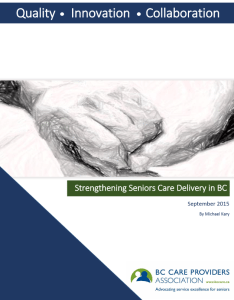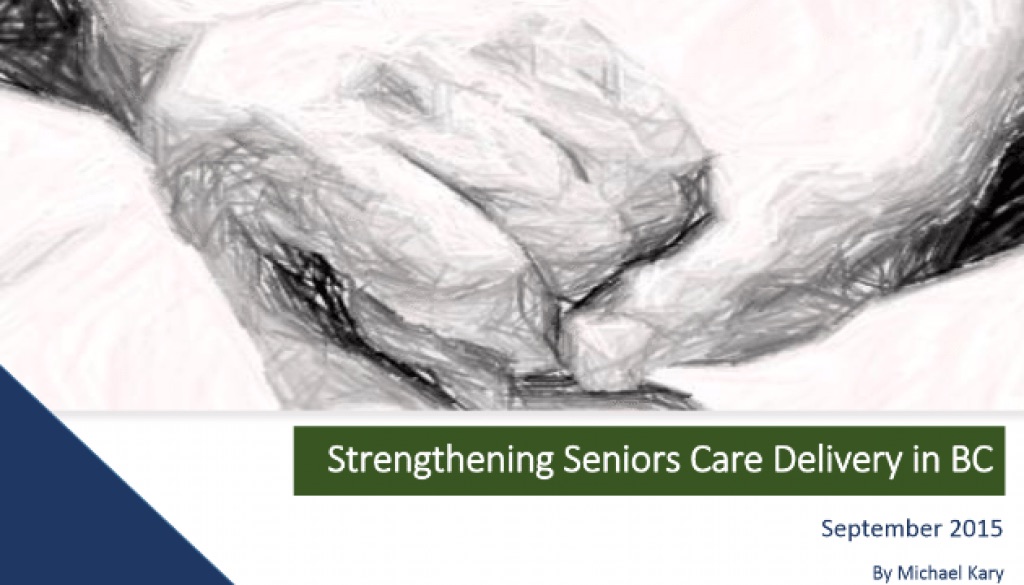 British Columbia care providers are proposing the provincial government and health authorities commit to transferring one per cent of their annual acute care budget to improve the quality of community care and implement more responsive continuing care models to meet the growing needs of a rapidly ageing population.
British Columbia care providers are proposing the provincial government and health authorities commit to transferring one per cent of their annual acute care budget to improve the quality of community care and implement more responsive continuing care models to meet the growing needs of a rapidly ageing population.
These are two of five recommendations being proposed in a new policy paper from the BC Care Providers Association (BCCPA) that responds to the provincial government’s February 2015 request for ideas to sustain and strengthen BC’s mental health, primary and community care system. The BC Ministry of Health estimates the growth in demand for health care for frail seniors living in residential care will increase by 120% over the next 20 years.
Click here to view the report titled: Quality-Innovation-Collaboration: Strengthening Seniors Care Delivery in BC.
“Our population is rapidly ageing and we won’t be in a position to deal with this demographic dilemma unless we innovate,” says Elaine Price, President of the BCCPA. “By redirecting only one percent funding from acute care into the continuing care sector we can improve health outcomes for seniors and provide more British Columbians with access to hospital treatments and surgeries.”
Within five years, the report estimates this approach would result in over $320 million that could be re-directed to support annual operation of 4,300 new long term care beds; or 12 million more care aide hours; or 8 million home support hours.
At a recent BCCPA convention, Dr. Chris Simpson, past-President of the Canadian Medical Association told the assembled delegates “the reason your father has to wait nine months for a hip replacement is that the beds are being used by dementia patients…that is the single biggest reason why elective surgery wait times are so long.”
“We’ve got to get away from the tendency to institutionalizes these patients in the acute care sector because once they’re in there it’s hard to get them out,” said Simpson. “Long-term care facilities, in an ideal situation, know how to deal with the management of complex diseases.”
The Report also calls for exploration of new seniors care delivery models – including Continuing Care Hubs that will integrate community health services and emergency professionals around residential care facilities to help take pressure off emergency rooms and acute care hospital units.
“New continuing care models can be developed with redirected funding to help seniors live in the most appropriate care setting,” says Michael Kary, Director of Research and Policy and the author of the report. “This report demonstrates a growing need for significant transformation of the traditional care home into a new ‘Care Hub’ that offers a suite of community services – including some that are not currently funded or allowed by the Ministry or health authorities.”
Other BCCPA recommendations to the Minister of Health include:
- Establishment of a new Continuing Care Collaborative with the Ministry of Health, health authorities and non-government providers to reshape seniors care and implement recommendations outlined in recent provincial policy papers and this report.
- Using vacant residential care beds and assisted living units to reduce acute care pressures, unnecessary ER admissions and hospital visits.
- Creation of a public registry to track vacant beds and ALC beds.
- Re-define existing eligibility criteria for complex care and remove the restrictions relating to the number of prescribed services in Assisted Living to allow seniors to remain at home longer or the most appropriate care setting.
“Over the coming weeks and months, we will reach out to government leaders and seniors care stakeholders across the province to promote these recommendations and deliver results on behalf of our members and the seniors we serve,” says Daniel Fontaine, CEO for the BCCPA. “We look forward to reporting progress in the year ahead.”
Serving private and non-profit community care providers, the BCCPA was established in 1977. It is the leading industry association for BC’s continuing care sector. Its growing membership includes over 265 residential care, assisted living, home support/care and commercial members across BC.





